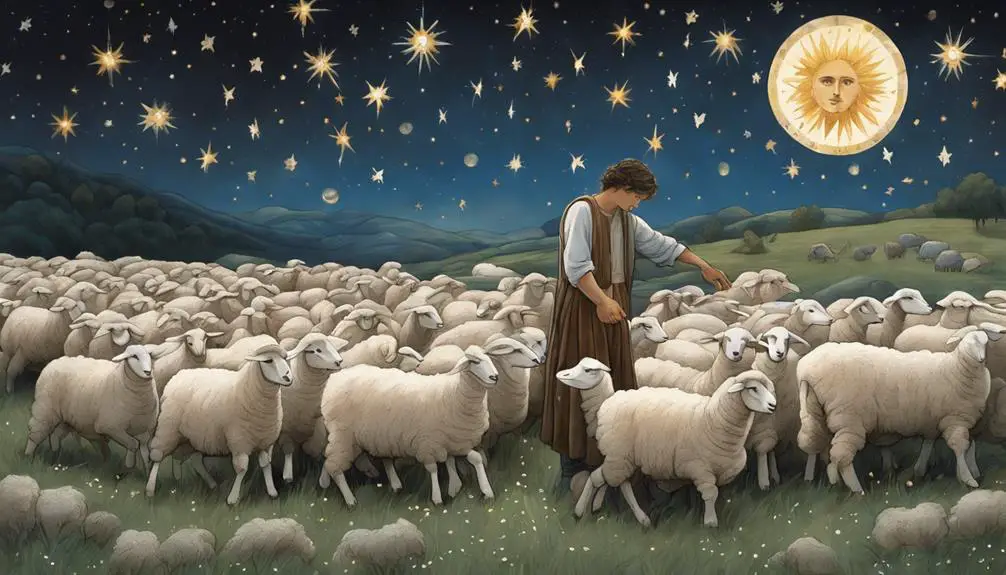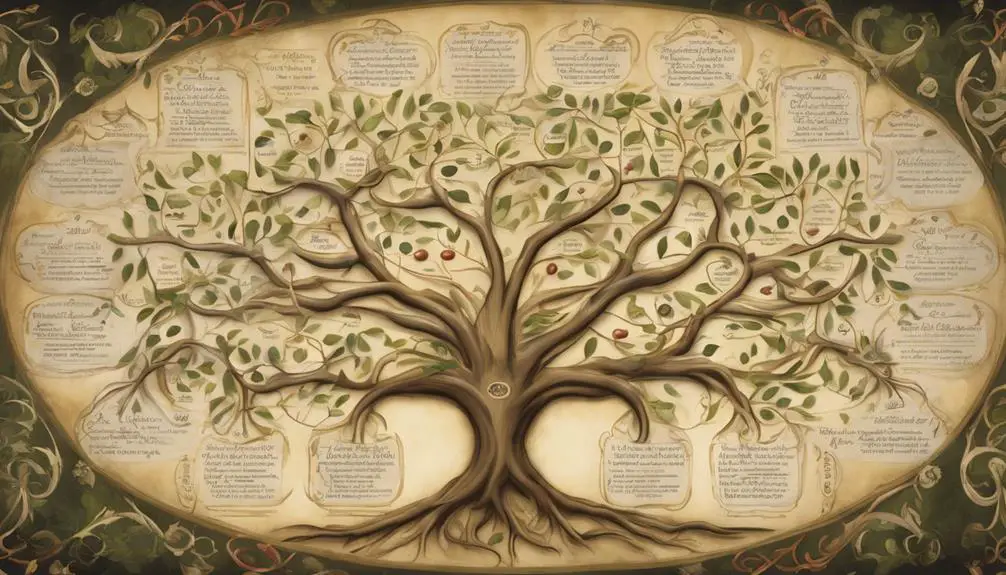Learn about the intriguing significance of the number 14 in biblical narratives, from genealogy to divine interventions, and uncover its hidden meanings.

What Does Number 14 Mean in the Bible
In the tapestry of biblical narratives, the number 14 weaves through with a pattern of significance that's hard to ignore. You'll find it marking moments of genealogical importance, symbolizing passages of deliverance, and even counting the years of servitude and divine extensions of life.
From the story of Jacob to the reign of King Hezekiah and the meticulous account of fourteen generations, this number carries a weight that prompts a deeper exploration. What might seem like mere numbers at first glance, opens up a realm of historical and spiritual interpretations.
Let's uncover the layers together, shall we?
Key Takeaways
- The number 14 symbolizes divine lineage and perfection in biblical numerology.
- It marks significant events of judgment and deliverance, such as Passover.
- Reflects trials and transformation, notably in Jacob's 14-year pursuit to marry Rachel.
- Demonstrates divine orchestration of history, from Abraham to Jesus.
The Genealogical Significance

In analyzing the genealogical significance of the number 14 in the Bible, we find it intricately woven into the fabric of biblical narratives, particularly in the lineage of Jesus as outlined in the Gospel of Matthew. This number doesn't just randomly appear; it's deliberately used to structure Jesus' genealogy into three sets of 14 generations, emphasizing the divine lineage and patriarchal symbolism. This structuring isn't merely for historical recounting but serves a deeper, theological purpose, symbolizing perfection and completeness in biblical numerology.
The choice of 14 generations, you'll see, isn't arbitrary. It reflects a carefully constructed narrative designed to highlight Jesus' rightful place in divine history. By aligning Jesus' ancestry in such a pattern, Matthew underscores the fulfillment of Old Testament prophecies and the continuation of the patriarchal lineage, deeply rooted in Jewish tradition. This numerical design doesn't just tell a story; it weaves Jesus' divine and human origins into the very fabric of God's salvation history, reinforcing His role as the Messiah.
Through this genealogical framing, the number 14 thus becomes a symbol of divine orchestration and fulfillment, echoing the patriarchal blessings and promises that thread through the Bible's narrative landscape.
Passover and Deliverance
Exploring further, we uncover the number 14's significant role during the Passover, a pivotal event marking Israel's deliverance from Egyptian bondage, which further cements its symbolic resonance throughout biblical narratives. The Exodus narrative, rich in symbolism and divine intervention, intricately weaves the number 14 as a marker of God's timing and deliverance. The Passover, occurring on the 14th day of the first Hebrew month, signifies not just physical liberation but also spiritual renewal.
Here are three critical aspects to consider:
- The Timing of the Passover: The Passover lamb was to be selected on the 10th day and kept until the 14th day, when it was to be sacrificed. This period of waiting symbolizes preparation and purification, leading to deliverance and redemption.
- Plague Significance: The final, most devastating plague, the death of the firstborn, occurred at midnight on the 14th, underscoring the number 14's association with judgment and deliverance.
- Recurring Theme: The number 14 recurs throughout the Exodus narrative, emphasizing cycles of deliverance and God's faithfulness to His covenant promises.
This analytical exploration reveals how the number 14 not only marks historical events but also embodies deeper theological themes of judgment, deliverance, and divine fidelity within the Exodus narrative.
Jacob's Years of Servitude

Delving into the narrative of Jacob's years of servitude, we observe another profound manifestation of the number 14, which not only marks a significant period in his life but also echoes themes of endurance, transformation, and divine orchestration. Jacob's labor for love, specifically his marital pursuit of Rachel, encapsulates a remarkable journey underpinned by the number 14.
Initially agreeing to work seven years for Rachel's hand, Jacob's expectations are upended when he's deceived into marrying Leah, Rachel's sister. Undeterred, he commits to another seven years of labor, totaling 14 years, to marry Rachel.
This period of servitude under Laban, Rachel and Leah's father, is emblematic of the trials and tribulations that often precede divine fulfillment. It's a testament to Jacob's unwavering commitment and the lengths to which he's willing to go in his pursuit of love and fulfillment. The dual seven-year periods highlight not only the significance of the number 14 in biblical narratives but also the transformative power of faith and perseverance.
In Jacob's story, we see a clear illustration of how divine timing and human determination intertwine, leading to the realization of a promised destiny.
King Hezekiah's Life Extension
Shifting focus to another significant biblical narrative, we find that King Hezekiah's life extension by 15 years further illustrates the profound impact of divine intervention in human affairs, echoing themes of faith and divine mercy. This event isn't just a testament to the power of prayer but also highlights the significance of Hezekiah's role in the biblical history through his reforms and the challenges he faced during the Assyrian siege.
Here are three key aspects to consider:
- Hezekiah's Reforms: He implemented significant religious reforms, reinstating the worship of Yahweh and removing symbols of idolatry from the temple. These actions demonstrated his commitment to restoring faith among the people of Judah, making his plea for more time on earth not just a personal request but a bid for more time to serve God's purpose.
- Assyrian Siege: The context of the Assyrian siege adds a layer of complexity to Hezekiah's story. His faith and strategic wisdom in defending Jerusalem show a leader deeply reliant on divine support while actively working to secure his kingdom's future.
- Divine Intervention: The extension of Hezekiah's life by 15 years after his prayerful appeal to God underscores the Bible's theme of divine mercy and intervention, suggesting that faith and righteousness can indeed sway the course of one's life.
The Fourteen Generations

In the biblical narrative, a notable pattern emerges with the sequence of fourteen generations, revealing a meticulously structured lineage that spans from Abraham to David, then from David to the Babylonian exile, and finally from the exile to Jesus Christ, underscoring a divine orchestration of history. This pattern isn't merely a historical recount but a profound demonstration of divine completion, a theme deeply woven into the fabric of biblical numerology.
You'll find that the number 14 doesn't just appear arbitrarily. It's a calculated symbol, reflecting numerological patterns that the ancient authors used to convey theological truths. These patterns aren't coincidental; they're intentional markers placed to highlight the perfect timing and precision in God's plan for humanity.
Analyzing these fourteen generations offers you more than a historical timeline; it provides insight into how divinity interacts with humanity. Each segment—Abraham to David, David to the exile, and the exile to Christ—serves as a testament to God's unwavering commitment to His people. Through these generations, you witness the unfolding of a divine narrative, meticulously planned and executed with precision, demonstrating that history itself is a tapestry of divine intentionality.
Frequently Asked Questions
How Does the Number 14 Relate to the Concept of Forgiveness or Atonement in Biblical Narratives?
In exploring how the number 14 connects to forgiveness or atonement in biblical narratives, you'll find rich genealogy insights and historical contexts. This number symbolically ties to deliverance and salvation, particularly evident in genealogies of Jesus, where it underscores God's plan for redemption.
Through these narratives, 14 embodies a profound link to atonement, highlighting the intricate ways biblical texts weave numbers into their deeper theological messages about forgiveness and divine intervention.
Are There Any Specific Prophecies or Visions in the Bible Associated With the Number 14?
Yes, the Bible associates the number 14 with specific prophecies and visions, notably in the generational cycles and royal lineages.
For instance, in Matthew's Gospel, the genealogy of Jesus is structured around three sets of 14 generations, symbolizing divine order and fulfillment of prophecy.
This pattern underscores the messianic lineage through David's royal line, providing deep insight into the theological significance of numbers in biblical narratives and God's sovereign plan through history.
In Biblical Numerology, How Is the Number 14 Differentiated From Other Significant Numbers Like 7 or 12?
In biblical numerology, you'll find that the number 14 stands out by representing generational cycles, essentially doubling the significance of the number 7, which symbolizes divine perfection.
Unlike 12, which often denotes governmental perfection and authority, 14 emphasizes the importance of time and lineage in divine plans.
This distinction highlights how specific numbers carry unique symbolic meanings, weaving a complex narrative of spiritual truths and divine orchestration throughout the scriptures.
Does the Number 14 Have Any Significance in the Construction or Dimensions of Biblical Structures, Such as the Temple or Noah's Ark?
In exploring biblical structures, you won't find the number 14 directly influencing the Ark's dimensions or Temple architecture. Instead, other numbers play pivotal roles, reflecting spiritual symbolism and divine order.
The Ark and Temple, rich in measurements and detailed planning, showcase a profound understanding of space and purpose, rather than adherence to the numerological significance of 14.
Analyzing these structures offers a glimpse into the meticulous, inspired craftsmanship of biblical times.
How Is the Number 14 Reflected in the Practices or Observances of Modern Christian Traditions Based on Biblical References?
In modern Christian traditions, the number 14 subtly influences feast timing and generational practices, reflecting its biblical roots. You'll find the observance of specific feasts, like Passover, which begins on the 14th day of Nisan, showcasing this numerical significance.
Moreover, generational practices, such as commemorating ancestors or spiritual milestones every 14 years, echo biblical narratives. This nuanced incorporation highlights a deep, ongoing connection between ancient scripture and contemporary faith practices.
Conclusion
You might think that finding deep significance in numbers like 14 in the Bible is stretching interpretations too far. Yet, when you delve into the text, the patterns and connections surrounding the number 14— from genealogical significance, Passover, Jacob's servitude, to Hezekiah's life extension—reveal a meticulous design.
These narratives aren't random; they're woven into the fabric of biblical storytelling, offering layers of meaning that underscore the text's divine inspiration and intricate construction. Reflecting on these connections enriches our understanding, proving that numbers in the Bible hold profound symbolic weight.



Sign up